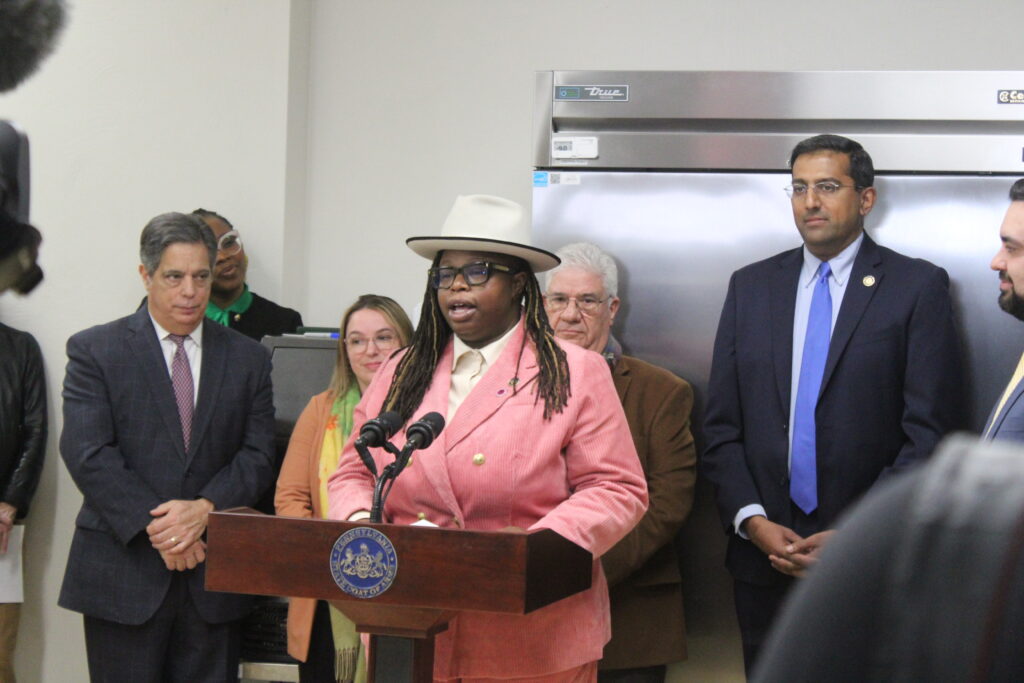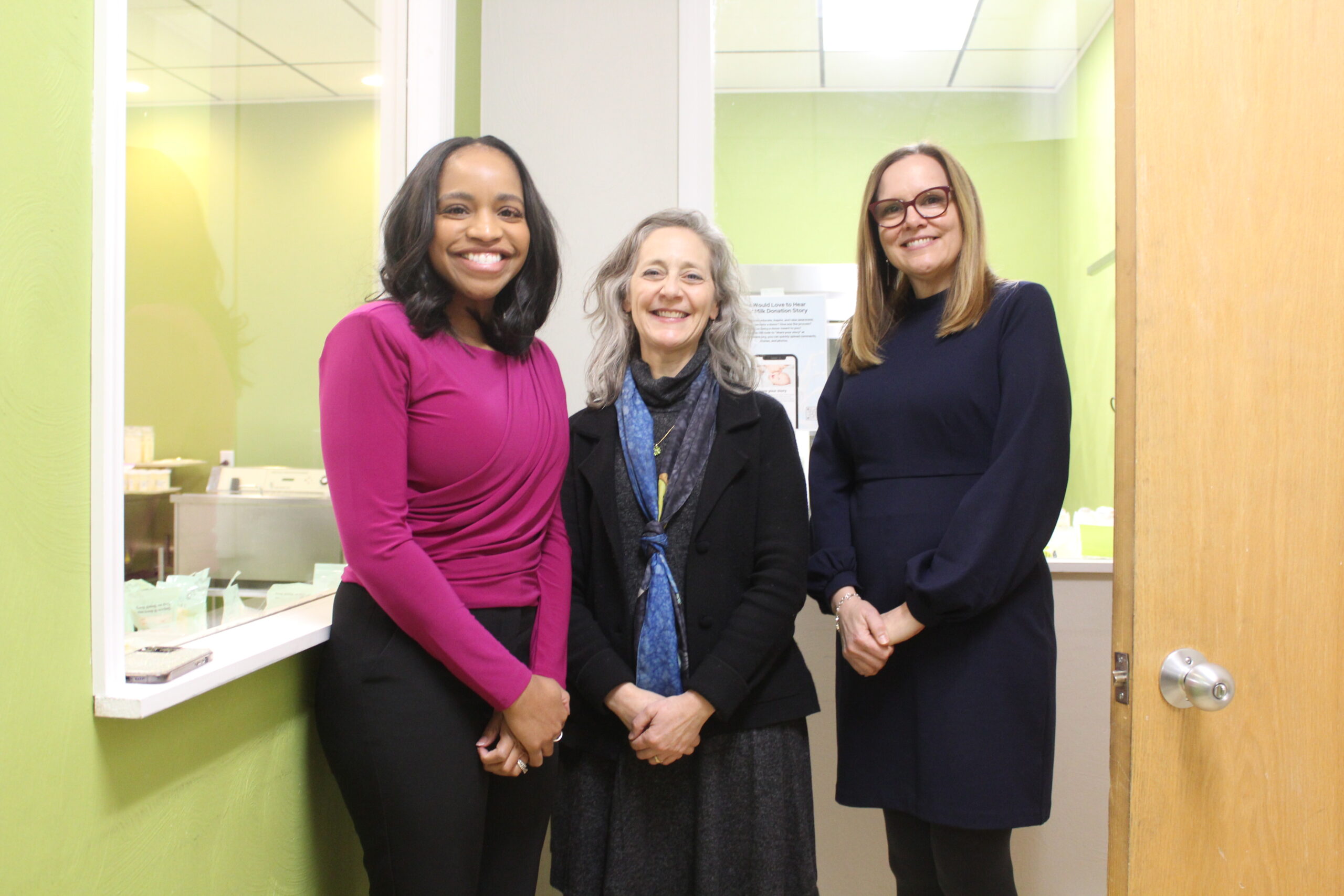It has taken five years, but Medicaid will now cover prescribed and pasteurized breast milk as critical nourishment for medically fragile infants in Pennsylvania.
Owen’s Law, passed with unanimous support from the General Assembly in November, needed 60 days for it to be enacted, and medical leaders and elected officials gathered at the Mid-Atlantic Mothers’ Milk Bank in the Strip District last week to celebrate the change that will give access and financial relief to many parents in the state.
A baby boy whose family lives in Indiana, Pa., inspired the law. In 2018 Owen was born at 31 weeks with a birth weight just below the criteria to be eligible to receive human donor milk. Although he was doing well at first, he started to experience serious gastrointestinal inflammation and died after living 18 days. His family told their story to WPXI-TV last year.
This new law, sponsored by Sen. Michele Brooks, R-Crawford County, will grant children who are less than a year old access to medically prescribed pasteurized human donor milk by requiring Medical Assistance coverage in inpatient and outpatient settings. The donor milk must be obtained from a milk bank licensed in Pennsylvania or through a hospital licensure process in accordance with the Keystone Mother’s Milk Bank Act of 2020, sponsored by Rep. Donna Oberlander, R-Clarion County, to ensure safety of the milk.
Donor milk is medically prescribed for children with heart problems and certain serious health care issues, including neonatal abstinence syndrome, which occurs when infants are exposed to opioids or other substances of abuse in utero, according to information posted on the Pennsylvania Senate Republicans website. As a result, the use of donor milk is a proven cost-effective way to improve health outcomes of the child and lower health care costs.
Denise O’Connor, Mid-Atlantic Mothers’ Milk Bank executive director, called the bill lifesaving when it was passed last year. “At the milk bank, we have seen first-hand the struggles outpatient families face when having to pay out of pocket for their medically vulnerable child’s needed nutrition,” she said in a statement. “With Owen’s Law in place, not only will these families now have coverage for their baby’s pasteurized donor human milk, but it will establish more equitable access to donor milk for inpatient infants in NICUs [neonatal intensive care units] across PA.”
She is very grateful to Brooks and Oberlander as well as other Pittsburgh-area state representatives, notably La’Tasha Mayes, D-Morningside, and Dan Frankel, D-Squirrel Hill, for their support of this bill. Dr. Debra Bogen, Pennsylvania’s acting secretary of health and former director of the Allegheny County Health Department, served on the organization’s founding board along with some of the doctors O’Connor reached out to in the early days. Bogen spoke at the news conference.
Safety and cost are assured for these infants, O’Connor stressed, when they obtain donated milk through her organization and others. Right now the Mid-Atlantic Mothers’ Milk Bank serves 60 hospitals in Pennsylvania and West Virginia, and it also assists with donations to hospitals and infants in Delaware, New Jersey and Maryland. The need is that great. O’Connor explained that when the Milk Bank here opened in 2016 it distributed 57,000 total ounces and worked with one-quarter of that number of hospitals. Now it prepares and distributes 35,000 ounces monthly.
It is accredited by Human Milk Banking Association of North America. According to its website, all 27 accredited milk banks follow the same strict safety guidelines and can help one another to ensure that all NICUs and ill outpatients across the United States and Canada have what they need.
It’s been an evolution, she says, from what she witnessed early in her medical career. Many hospitals didn’t use donor milk, and insurance coverage and knowledge of the benefits of mother’s milk among medical professionals varied widely. O’Connor saw this firsthand as a lactation consultant and “heard about terrifying conditions in the NICUs.” She started cold calling hospitals and doctors about the benefits of breast milk, and that work led to her founding the Milk Bank.
She and others emphasized at the news conference that pasteurized donor human milk provides critical nutrients, immunological support for medically fragile babies and is the standard of care in the region’s NICUs. While babies in the NICU are the primary recipients, donor milk use is increasing for outpatients with significant medical issues like cancer and even healthy babies, both in the mother-baby units and in the early days at home if supplementation is necessary due to its medical benefits and promotion of healthy gut bacteria.
Serious gastrointestinal issues can be fatal to these babies, and Owen died from necrotizing enterocolitis or NEC after first doing well and being fed formula in the NICU before his mother, Annette Kubalek, could develop her own milk. Neither she nor her husband, John, could attend the news conference, but she provided a statement that O’Connor read: “My family and I are honored to see this change come to our home state. Thank you to all who have supported Owen’s bill and helped it to become law. We are deeply grateful for all of your tireless efforts towards making this wonderful change in our beautiful state of Pennsylvania. Creation of this law has been quite bittersweet for us. We wish it would have been enacted years ago, so that it may have saved our Owen. However, it was he and his life and death that was able to help demonstrate just how important a law like this is. It is our hope, thanks to Owen’s Law, that no other at-risk Pennsylvania babies are not offered potentially life-saving donor milk.”

O’Connor said that NEC affects up to 10% of pre-term and low birth weight babies. “Half of those children will need surgery to remove the part of the intestine affected,” she said. “Babies that need surgery have a 40% mortality rate. We know that babies on mother’s milk protects them from these types of infection and inflammation. We can get rid of these cases of NEC. At some hospitals, 80% of cases can be avoided if the babies receive human milk — mother’s or donated — and we know we can get rid of 90% of the surgical cases. It’s a common NICU emergency.”
The Mid-Atlantic Mothers’ Milk Bank charges $4.50 per ounce for its milk, and that cost can be covered by some insurances. It offers help for others on a sliding fee scale up to 90%, but even with that, costs to families can reach up to $100 a day to feed their babies, and often that is not financially sustainable. Parents sometimes turn to social media seeking donated breast milk on their own instead, which is a major problem.
“They can get donated milk from 10 strangers that may not be compatible with what babies need, and there are diseases or drugs that can be transmitted through breast milk,” O’Connor said. “That can be very dangerous for a baby who is compromised. It is really dangerous for us to not have this medical service covered.”
Most babies drink 20 to 30 ounces of milk a day, she said. Her hope is that other insurances that do not cover prescribed mother’s milk follow Medicaid’s lead, which often occurs. The vast majority of the babies served by her organization qualify for Medicaid, and she also knows that even the 90% reduced rate is still a hardship for their parents.
The Mid-Atlantic Mothers’ Milk Bank seeks to break even for costs associated with the medical tests it runs on all the donated milk, O’Connor said. Mothers wanting to donate need to complete a screening process that includes blood testing. Technicians at the milk bank then test their milk for drugs and conduct a nutritional analysis before the milk is pasteurized and undergoes bacterial culturing and then is frozen, according to its website. Other costs for the organization include freezing, storage and shipping. The vast majority — 75-80% — is sent to NICUs, but it reaches mother-baby units at hospitals to supplement healthy babies and support healthy gut bacteria and promote maternal exclusive breastfeeding success, too. Outpatient use includes milk for babies with rare conditions or those who have exhausted all other nutrition options.
O’Connor pointed out that the use of the donated milk helps lower health care costs in other ways because fragile infants end up with long hospital stays and are often readmitted with constant health problems. Also, babies not growing or developing normally also develop recurring health issues.
Hospitals reimburse the organization via a processing fee for the milk, O’Connor said, and the insurance coverage helps with expenses as will the Medicaid reimbursement the bill provides once all is finalized.
O’Connor noted a key part of the bill lists specific medical conditions enabling babies to get the donor milk. “We can’t predict everything a child can suffer from, so it also includes requires preauthorization for other medical conditions. One example is children with congenital heart disease.”
She notes that not much has been written in medical journals about fragile infants’ needs for donated breast milk and its benefits. O’Connor predicts that this bill will help all those involved figure out what the actual medical need is and the results from more access to the milk. And because laws and coverage vary across the country, meaning many families cannot afford it, it’s an issue nationally, too. “It’s that best-kept secret,” she said. “There’s a lot of education that needs to happen.”
The bill’s passage and other actions encourage her, from the work being done in Mayes’ office to learn about the gaps in maternal health care to the emphasis on the issue in the governor’s and lieutenant governor’s offices, including support from second lady Blayre Holmes Davis. Mayes is co-chair of the Pennsylvania Black Maternal Health Caucus. “We have a lot of things in Western Pennsylvania right now that we can move the needle on maternal health care in this area,” O’Connor said.
The need for donated breast milk continues as all this unfolds, she also said. Women can donate in two ways — drop off at the Strip District facility or a depot in Westmoreland County or by shipping it via Fed Ex or UPS after following the milk bank’s guidelines.
The latter helps her organization obtain milk from far and wide. O’Connor noted that UPMC Altoona just opened a depot, sponsored by UPMC, too. A program exists for bereaved parents to donate for several weeks after their losses, something that Owen’s mother did after her son died.
All of the efforts help her organization increase their work to save babies and help so many thrive. “We firmly believe that with help from the moms who have excess [breast milk], there is definitely enough to cover the medically fragile babies,” O’Connor said. “It is not an infinite resource.”

Helen is a copy editor at the Pittsburgh Post-Gazette, but she's currently on strike. Contact her at hfallon@unionprogress.com.



